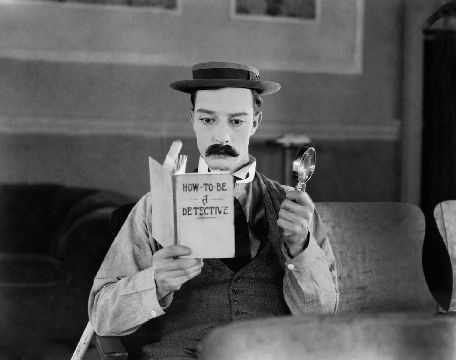Sherlock Jr. (1924) 
“Every inch of footage holds such a laugh!”

Director: Buster Keaton
Cast: Buster Keaton, Kathryn McGuire, Joe Keaton
Synopsis: A film projectionist longs to be a detective, and puts his meagre skills to work when he is framed by a rival for stealing his girlfriend’s father’s pocketwatch.
There are some who consider Sherlock Jr. to be Buster Keaton’s greatest movie. In terms of dazzling creativity and tight, concise editing, they could be right. Keaton’s surreal diversion, in which his sleeping hero dreams himself into a movie screen, was groundbreaking stuff back in 1924; the originality of the short sequence in which he finds himself instantly transported to a variety of different landscapes must have blown its original audiences away and, from a technical point of view, still impresses today. Just look at Keaton’s position as he travels between landscapes – his position and stance is constant, a matter of routine today but a feat that would have been considered impossible back in 1924 – had Keaton not achieved it. The only problem is that, for all its cleverness, Sherlock Jr. just isn’t as funny as Keaton’s other classics.
Keaton plays a movie projectionist who dreams of becoming a detective. He also dreams of being sweet Kathryn Maguire’s fella. And he looks like he’s making progress at first. There’s a tentative touching of hands on the sofa in the girl’s front room before the interjection of a rival in the burly shape of Ward Crane, billed as The Local Sheik. The Sheik is as poverty-stricken as Buster, however, and resorts to stealing the pocket watch belonging to the father (Joe Keaton, Buster’s father) to buy her a fancy box of chocolates. When the theft is uncovered, the Sheik plants his pawn ticket on Buster, who is unfairly blamed and banished by the father from seeing his daughter. Returning to his projection booth, Buster falls asleep and dreams he is a character called Sherlock Jr. in the film that is playing in the theatre.
At only 44 minutes long, Sherlock Jr. is barely longer than two shorts, which means it benefits from the kind of rapid pace that simply wouldn’t be feasible in a full-length feature. Apparently Keaton filmed another couple of reels worth of material but then edited them out of the finished movie in order to keep it so tight. There’s the usual stunts you’d expect from the comic, including one from a railway water tank that resulted in him fracturing his neck – an injury which wasn’t diagnosed for many years and gave rise to regular migraine attacks for Keaton. The stunts look terrific, it’s just a shame that the material simply isn’t as funny as some of his other stuff.
The historians give Keaton too much credit when praising this movie. He’s on record as claiming that he had no intention of deliberately infusing the film with a surrealistic air when he filmed himself climbing into the screen, but simply wanted to create the unrealistic feeling of a dream. Similarly, Keaton seemed too pre-occupied with pure action comedy for claims that, by having his character mimicking the hero of the film playing in the theatre at the end of the movie, he was consciously trying to make some profound statement about life imitating art to hold water. Either way, while it’s not one of Keaton’s greatest, Sherlock Jr. is still a movie of high quality worth seeking out.
(Reviewed 3rd September 2012)
httpv://www.youtube.com/watch?v=Xr6arzv4e2g
